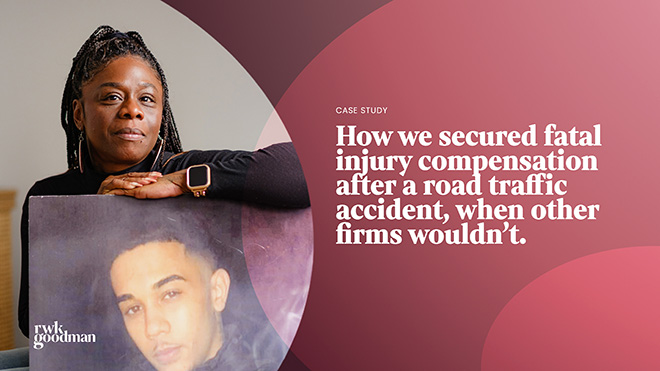Coroner concludes neglect in relation to pressure sore management which contributed to death of Alan Nippard

Holly Sumbler from our inquest team acts for the family of Alan Nippard who died under the care of Royal United Hospitals Bath NHS Foundation Trust. TheCoroner concluded that the failings in care amounted to neglect.
Mr Nippard was a much loved husband, father and grandfather. He died from complications of a preventable pressure sore during a hospital admission. The Coroner was concerned about failures in basic nursing care such as skin care, regular re-positioning and personal care. RWK Goodman instructed barrister, Marcus Coates-Walker of 1 Crown Office Row.
Alan (aged 74) lived at home with his wife in Bath. Prior to admission, Alan was mobile and was able to manage day to day tasks independently. In May 2022 he suffered a fall at home caused by septic arthritis in his knee. He was admitted to the Royal United Hospital in Bath, and was transferred to Pierce Ward. His knee injury was successfully treated and he
required an inpatient stay whilst he recuperated from the surgery.
Whilst an inpatient he developed a pressure sore to his sacrum. The pressure sore deteriorated significantly over the following weeks and he developed Fournier’s Gangrene, which is an acute necrotic infection of the penis, scrotum and buttocks. Sadly, Alan did not have the physiological reserves to survive surgical debridement under general anaesthetic and therefore the decision was taken to place him on end of life care and treat him palliatively. He died on 6 July 2022.
Inquest process
The inquest was heard in Avon Coroner’s Court before HM Area Coroner Maria Voisin. The hearing took place over 2 days in July 2023.
The family instructed RWK Goodman to support them through the coroner’s inquest. They had engaged in several meetings with the Trust following the death, but they had further questions they felt were still unanswered.
Live evidence was heard from 8 witnesses, including the Lead Tissue Viability Nurse for the Trust. In her evidence, she set out the expected standard of care for pressure sore prevention and management and described the stark contrast with the care that Alan
received. When asked by the Coroner about the standard of care provided he received, the Lead Tissue Viability Nurse said ‘It was shocking’.
Coroner’s Conclusion
In her formal conclusion at the end of all the evidence, the coroner concluded that Alan’s death was caused by a pressure sore, which was preventable with the provision of basic nursing care which was not provided. She concluded that there was a gross failure to provide basic nursing care. His death could have been prevented with the provision of basic nursing care, such as skin care, regular re-positioning and personal care, but this was not provided. He was not managed in line with recognised nursing practice and as a consequence his death was deemed to have been contributed to by the Trust’s neglect.
In the Coroner’s summing up she set out a number of areas of concern:-
- The initial screening tool was incorrectly completed scoring Alan ‘not at risk’, erroneously when he ought to have been deemed ‘at risk’ of developing pressure sores.
- A risk assessment ought to have been undertaken within 6 hours of admission, which was not carried out until 2 days later. This recorded he was high risk of developing pressure sores.
- The failure to provide an air mattress for the first 2 days of his admission, and the failure to provide an air cushion or repose boots at all. Both of these are key aids in preventing pressure sore development.
- Skin assessments should have been carried out daily, but there were done intermittently and were sometimes inaccurate noting his skin as normal when it clearly wasn’t. On other occasions they lacked categorization to assess progress of the ulcer.
- There was a failure by the nursing team to identify a new pressure sore on his heel, which was first identified by the podiatrist.
- Alan spent long periods of time on his back without proper repositioning. He should have been repositioned every 2-3 hours during the day and between 2-4 hours at night. It was estimated that on average he was on his back for 22 ½ hours of every 24 hour period, for the duration of his admission.
- Alan had a catheter and was incontinent during his admission. He should have been checked regularly and offered the toilet or the commode, using bed pans as a last resort. This was not achieved.
- The personal hygiene care provided to Alan was limited and not acceptable.
Prevention of Future Deaths report
The Coroner heard evidence that the Trust had taken steps to improve their care since Alan’s death, however she was not reassured that an incident of this type would not happen again on Pierce Ward. Specifically, she was concerned that there had been a number of other pressure sore incidents on Pierce Ward since the time of Alan’s admission, including 2 which
were identified during the month in which the inquest was heard (July 2023).
As the Coroner identified an ongoing risk of future deaths at the Trust, she issued a Prevention of Future Deaths report. In the report, the Coroner raised concerns over the training of staff on Pierce Ward, in particular on risk assessment, prevention care and treatment of pressure sores.
Holly says ‘It was a privilege to act for Alan’s family in this inquest. It is tragic that Alan’s death could have been prevented if he had received basic nursing care. It is deeply concerning that there have been a number of other pressure sore incidents on Pierce ward around the same time, and also a further couple of incidents more recently despite improvement made by the Trust, and we sincerely hope that the inquest process and the Coroner’s Prevention of Future Deaths report will help to prevent others going through something similar.’

Our specialist inquest solicitors are here to help you get the answers you deserve following the death of a loved one.
Call now
More insights from our inquests and fatal claims team
View more articles related to Inquests and Fatal Claims







